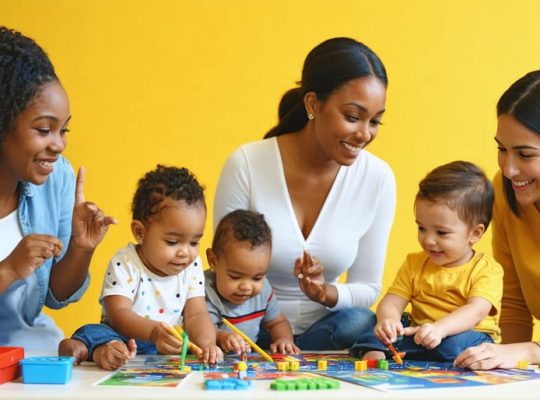Families form the bedrock of a child’s emotional and psychological development, serving as more than just a support system. Understanding the four essential functions of family unlocks the key to nurturing your child’s mental well-being and creating lasting positive impacts across generations. From providing unconditional emotional support to establishing cultural roots, each function works together to create a nurturing environment where children can thrive. As society evolves and faces new challenges, these core family functions remain constant guideposts, helping parents navigate their crucial role in raising resilient, well-adjusted individuals. Whether you’re a new parent seeking direction or an experienced caregiver looking to strengthen your family bonds, understanding these four fundamental functions provides a practical framework for creating a healthy, supportive home environment.
Emotional Support: Building Strong Mental Health Foundations

Creating Safe Emotional Spaces
Creating a safe emotional space within the family is crucial for healthy child development. When children feel secure expressing their feelings, they develop better emotional intelligence and stronger mental health. This begins with parents modeling emotional openness and validating their children’s feelings, even during challenging moments.
Dr. Sarah Chen, a family therapist, notes: “Children learn emotional regulation by watching how their parents handle feelings. When parents acknowledge and discuss emotions openly, children feel permission to do the same.”
Simple practices like dedicated family time, active listening without judgment, and maintaining predictable routines help build this emotional safety net. Parents can create “emotion-friendly” zones where children know it’s okay to express themselves, whether they’re feeling joy, anger, or sadness.
Remember that creating emotional safety isn’t about fixing every problem – it’s about being present and supportive. This might mean sitting with a frustrated child, offering comfort during disappointment, or celebrating their accomplishments, no matter how small. When families prioritize emotional safety, children develop the confidence to navigate life’s challenges with resilience and self-awareness.
Building Resilience Through Family Bonds
Family bonds serve as the foundation for building emotional resilience in children and adults alike. When family members consistently show up for each other during both celebrations and challenges, they create a secure base from which individuals can face life’s obstacles with confidence.
Dr. Sarah Chen, a family therapist, explains, “Strong family relationships act as emotional shock absorbers, helping children develop coping mechanisms they’ll use throughout their lives.” This resilience-building occurs through daily interactions, from comforting a child after a difficult day at school to celebrating small achievements together.
Families that practice open communication, express emotions freely, and work through conflicts constructively help members develop crucial emotional skills. Whether it’s siblings learning to resolve disagreements or parents modeling healthy stress management, these experiences create a template for handling future challenges.
Research shows that children from supportive family environments typically demonstrate greater emotional regulation, higher self-esteem, and better problem-solving abilities. Creating regular family rituals, maintaining consistent support systems, and fostering a safe space for vulnerability all contribute to building this essential emotional foundation.
Social Development: Your Family’s Role as First Teachers
Teaching Social Skills at Home
The family home serves as the first and most crucial classroom for developing social skills. Through daily interactions, children learn fundamental social competencies like sharing, taking turns, and showing empathy. Parents model these behaviors during everyday activities, from family meals to playtime, creating natural opportunities for children to practice social skills in a safe environment.
Simple activities like board games teach children about following rules and managing emotions when things don’t go their way. Family discussions help develop active listening skills and respectful communication. Even conflicts between siblings, when properly managed, can become valuable lessons in negotiation and compromise.
Parents can actively foster social development by creating opportunities for social interaction, such as hosting playdates or participating in family-friendly community events. They can also guide children through social challenges by role-playing difficult situations and discussing appropriate responses.
Remember that children learn best through observation and practice. When family members consistently demonstrate kindness, respect, and effective communication, children naturally incorporate these behaviors into their own social interactions, preparing them for success in broader social settings.
Bridging Home and Community
Families serve as crucial bridges between children and their community, helping them develop the confidence and skills needed for connecting with broader social networks. Through family activities like neighborhood gatherings, religious services, or community events, children learn to navigate social situations with the security of having their parents nearby.
Think of your family as a safe launching pad. When children participate in sports teams, join clubs, or attend social events with family support, they gain valuable experience in building relationships while knowing they have a secure base to return to. This gradual exposure helps them develop social confidence at their own pace.
Parents can facilitate these connections by organizing playdates, encouraging participation in community activities, and modeling positive social interactions. Something as simple as regular visits to the local library or playground can help children form meaningful connections beyond the family unit.
Remember, each child’s comfort level with social situations differs, and families can adjust their approach accordingly, ensuring a balanced and supportive transition into community engagement.
Physical Care: Supporting Health and Development

Creating Healthy Routines
Families play a crucial role in establishing healthy routines that shape children’s lifelong habits. When parents consistently model and encourage positive behaviors, they create a foundation for physical and emotional well-being that benefits the entire family.
Starting with regular mealtimes creates opportunities for connection and nutrition. Many families find that eating together at least once a day strengthens bonds while teaching healthy eating habits. Similarly, maintaining consistent sleep schedules helps children develop better cognitive function and emotional regulation.
Physical activity as a family doesn’t need to be complicated – it could be as simple as evening walks, weekend bike rides, or dancing in the living room. These shared activities promote both health and family bonding.
Beyond physical health, establishing routines around emotional check-ins and quality time helps children feel secure and supported. This might include dedicated one-on-one time with each child, family game nights, or regular conversations about feelings during bedtime routines.
Remember that flexibility matters too. While routines provide structure, they should adapt to your family’s changing needs and circumstances. The goal is to create sustainable habits that support everyone’s well-being while strengthening family connections.
Accessing Healthcare Support
Families play a crucial role in connecting members with essential healthcare resources and support systems within their community. When parents actively engage with healthcare providers and maintain open communication about health concerns, they create a foundation for better health outcomes for the entire family.
Consider Sarah, a mother of two, who noticed her teenage son showing signs of anxiety. By reaching out to their family doctor and local mental health resources, she helped him access the support he needed early on. This proactive approach often makes a significant difference in treatment success.
Effective healthcare support within families includes scheduling regular check-ups, maintaining medical records, coordinating with specialists when needed, and ensuring all family members understand and follow treatment plans. Parents also serve as advocates, helping children and elderly family members navigate the healthcare system and communicate their needs effectively.
Community health centers, school nurses, and family support groups can provide additional resources and guidance. Many families find that building relationships with these support networks helps them better understand and access available health services, leading to improved overall family wellness.

Cultural Identity: Fostering Belonging and Values
Preserving Family Traditions
Family traditions serve as powerful threads that weave together our sense of identity and belonging. Whether it’s celebrating cultural holidays, preparing traditional recipes, or sharing stories passed down through generations, these practices help children understand their heritage and develop a strong sense of self.
Dr. Maria Chen, a family therapist, explains, “When children participate in family traditions, they’re not just learning about their culture – they’re experiencing a living connection to their roots. This gives them a foundation of security and confidence in who they are.”
Consider Sarah, whose family maintains their Vietnamese heritage by gathering every Sunday to make phở together. “My children not only learn about their culture through the food,” she shares, “but they also feel connected to their grandparents and extended family through these weekly rituals.”
Regular participation in cultural practices helps children develop pride in their background while building lasting memories. These shared experiences create a sense of continuity and stability, particularly important during times of change or stress. Families can preserve their heritage through simple daily routines, seasonal celebrations, or annual gatherings – each moment contributing to their children’s cultural identity and emotional well-being.
Connecting with Community Heritage
Families serve as vital bridges connecting children to their cultural heritage and broader community identity. Through shared traditions, celebrations, and storytelling, parents and relatives help children understand where they come from and their place within their cultural community. Whether it’s participating in traditional festivities, preparing family recipes passed down through generations, or speaking heritage languages at home, these experiences create meaningful connections to cultural roots.
Strong family engagement with community organizations, cultural centers, and religious institutions helps children develop a sense of belonging beyond the immediate family unit. When families actively participate in community events and cultural activities, children learn to appreciate diversity while feeling proud of their own heritage.
Parents can strengthen these connections by sharing family histories, maintaining relationships with extended family members, and creating opportunities for children to engage with their cultural community. This cultural grounding provides children with a strong sense of identity and self-worth, helping them navigate an increasingly diverse world while remaining connected to their roots.
The four functions of a family work together like pieces of a complex puzzle, each supporting and enhancing the others to create a nurturing environment for children’s mental health. When emotional support is strong, children feel secure enough to explore social connections. As they develop social skills, they’re better equipped to express their needs for physical care and embrace their cultural identity.
Research consistently shows that families who successfully balance these functions tend to raise more resilient children. For example, when parents provide emotional comfort while teaching cultural traditions, children develop both self-confidence and a strong sense of belonging. Similarly, proper physical care combined with social guidance helps children develop healthy relationships with their bodies and others.
Remember that no family performs these functions perfectly all the time, and that’s okay. What matters most is the consistent effort to maintain balance among these roles. By understanding how these functions interconnect, parents can make informed choices about where to focus their energy and when to seek additional support, ultimately creating a more stable and nurturing environment for their children’s mental health development.







